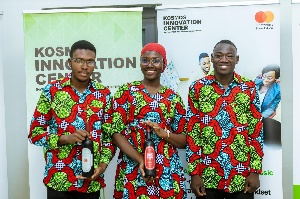Business News of Friday, 6 June 2025
Source: www.ghanawebbers.com
Harvesting opportunity: UDS innovators produce Tomavi Wines from Tomato
The University for Development Studies (UDS) trains students to identify opportunities. Its Third Trimester Field Practice (TTFP) Programme helps students enter the workforce or pursue further education. Entrepreneurs from UDS inspire others and stimulate economic progress.
UDS ranks as the third best university in Ghana. It is known for innovation and knowledge, reflected in its motto: "Knowledge for Service."
Three young innovators from UDS have created job opportunities. They aim to help smallholder farmers by transforming tomatoes into premium wines. This initiative aligns with UDS's mission and supports government efforts to reduce youth unemployment.
Tomavi Wines is a start-up agribusiness founded by Firdaus Mohammed Awal, Issah Muleikatu, and Ramzi Badrun Wunnam. Firdaus is the CEO and holds a BSc in Community Nutrition. Issah is a Pharmacy student and serves as Chief Marketing Officer. Ramzi is a final-year Physician Assistantship student and Chief Finance Officer.
Their focus is on making quality wines from tomatoes. This prevents post-harvest losses and provides stable market access for small-scale farmers. The initiative aims to encourage tomato cultivation for healthy beverages.
Tomavi Wines uses limited additives to meet market standards while ensuring nutritional value. The founders are passionate about improving the lives of smallholder farmers through their products.
Firdaus has experience as a nutritionist at Tamale Teaching Hospital, focusing on diets. Issah has promoted brands at school and was part of an on-campus venture selling food items. Ramzi excels in finance management, supporting his father's business before joining Tomavi Wines.
The team noticed that many tomato farmers face post-harvest losses affecting their income. They decided to create wine from tomatoes to add value to this nutritious food source.
Research shows that using tomatoes for wine reduces waste and supports sustainable agriculture. This creates new markets for farmers, helping them earn better incomes while contributing to food security.
Tomavi Wines aims to produce high-quality beverages that support local economies. As a community-rooted start-up, it promotes entrepreneurship among youth.
The founders are motivated by their impact on farmers and consumers alike. A market survey showed high demand for their product, fueling their passion.
They believe teamwork, focus, and resourcefulness helped them succeed despite challenges like wasted tomatoes due to poor storage or market access.
KIC sponsors their entrepreneurship journey with funding from the Mastercard Foundation, enabling early sales and impacts. They also seek support from organizations like UNICEF and UNDP to empower youth businesses.
Their goal aligns with achieving Sustainable Development Goals (SDGs) by 2030 through youth empowerment in economic growth.
For aspiring entrepreneurs, they advise persistence during tough times; there’s always hope ahead.
Tomavi Wines won the 2024 Kosmos Innovation Center's Agritech Classic Finals Pitch Competition. They have partnered with around 1,000 farmers for sustainable tomato sourcing.
Entrepreneurs in Ghana face challenges due to inadequate resources and capacity building opportunities. Education plays a crucial role in nurturing talent across all sectors of the economy.
Integrating entrepreneurial studies into school curricula can shift mindsets toward creating opportunities rather than seeking comfort alone. Collaboration between government and private sectors can enhance skills development among young entrepreneurs too.
In five years, Tomavi Wines envisions becoming a million-dollar company leading wine production across Africa while supporting small-scale tomato farmers through training partnerships.
They encourage young businesspeople: “Where there’s will, there’s way.” Focused perseverance leads to success; stay positive even when facing difficulties.
Tomavi Wines welcomes partnerships with investors interested in addressing post-harvest losses or food insecurity issues within the tomato value chain.











